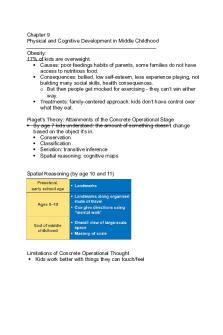Physical and Cognitive Development in Middle and Late Childhood PDF

| Title | Physical and Cognitive Development in Middle and Late Childhood |
|---|---|
| Course | Development Psychology |
| Institution | University of North Carolina at Charlotte |
| Pages | 2 |
| File Size | 80.7 KB |
| File Type | |
| Total Downloads | 58 |
| Total Views | 136 |
Summary
Cognitive development in middle to late childhood...
Description
7. Physical and Cognitive Development in Middle and Late Childhood Psy 241 Gibson •
• • •
• •
•
Piaget’s Theory o Concrete Operations (7-11/12 Years) § Logical reasoning (can use logic quite well) § Can use operations and logic § Decentering • Can comprehend multiple points of view § Understand reversibility (can go back and forth with their logic and reasoning) § Reasoning is largely tied to the objects of the outside world and tangible examples Education in Middle Childhood o 6 – 12 years = Elementary School(ish) o Focused on reading, writing, and mathematics Intelligence o Problem-solving skills and the ability to learn from, and adapt to, the experiences of everyday life Intelligence Testing o Intelligence quotient § IQ = (Mental Age/Chronological Age) x 100 o Two most common tests: § Stanford-Binet 5 • Fluid reasoning, knowledge, quantitative reasoning, visual-spatial reasoning, and working memory § Wechsler Scales • Multiple scales including verbal comprehension, working memory, processing speed Intelligence Scores Measuring Intelligence o Highly controversial § Against • Intelligence is much more complex and multifaceted than what we currently test • Tests are culturally biased • Reducing a person’s intelligence to a number is simplistic and ethically questionable § For • Better than alternative methods for predicting outcomes like school grades, achievement test scores, and occupational success • Valuable for special education decisions • Other methods for evaluating special education decisions, like teacher or psychologist recommendations, may be even more biased Other Theories of Intelligence o Sternberg’s tri-archaic theory (some people have all three of these intelligences to variant levels) § Analytical intelligence • Ability to analyze, judge, evaluate, compare, and contrast § Creative intelligence • Ability to create, design, invent, originate, and imagine § Practical intelligence • Ability to use, apply, implement, and put ideas into practice o Gardner’s multiple intelligence theory
§ § § § § § § §
Linguistic (literature, writing, speaking) Logical-mathematical (good at mathematics and science, logic and reasoning) Spatial (visual learners, imaginations (ex: architect)) Musical (music, auditory places, rhythm) Naturalistic (very good at nature, understand biological systems like the body and animals) Bodily-kinesthetic (Hands on learners) Intrapersonal (understands their thoughts and feelings, like being alone) Interpersonal (good at others and understand other peoples thoughts and feelings)...
Similar Free PDFs
Popular Institutions
- Tinajero National High School - Annex
- Politeknik Caltex Riau
- Yokohama City University
- SGT University
- University of Al-Qadisiyah
- Divine Word College of Vigan
- Techniek College Rotterdam
- Universidade de Santiago
- Universiti Teknologi MARA Cawangan Johor Kampus Pasir Gudang
- Poltekkes Kemenkes Yogyakarta
- Baguio City National High School
- Colegio san marcos
- preparatoria uno
- Centro de Bachillerato Tecnológico Industrial y de Servicios No. 107
- Dalian Maritime University
- Quang Trung Secondary School
- Colegio Tecnológico en Informática
- Corporación Regional de Educación Superior
- Grupo CEDVA
- Dar Al Uloom University
- Centro de Estudios Preuniversitarios de la Universidad Nacional de Ingeniería
- 上智大学
- Aakash International School, Nuna Majara
- San Felipe Neri Catholic School
- Kang Chiao International School - New Taipei City
- Misamis Occidental National High School
- Institución Educativa Escuela Normal Juan Ladrilleros
- Kolehiyo ng Pantukan
- Batanes State College
- Instituto Continental
- Sekolah Menengah Kejuruan Kesehatan Kaltara (Tarakan)
- Colegio de La Inmaculada Concepcion - Cebu















